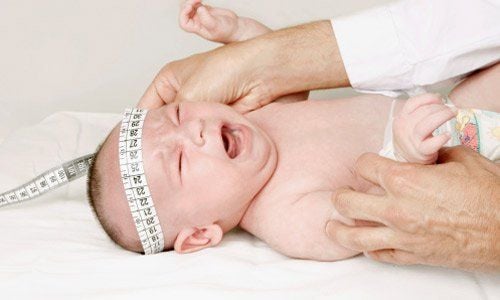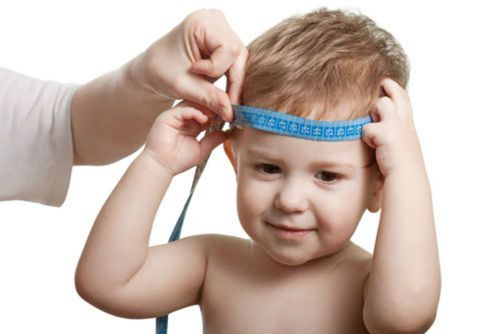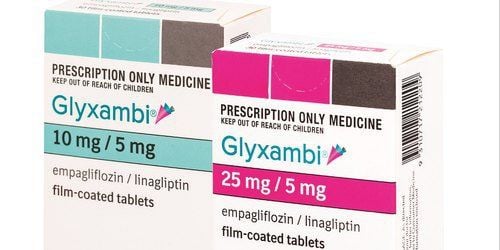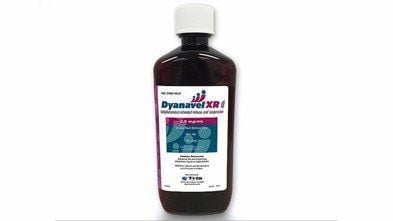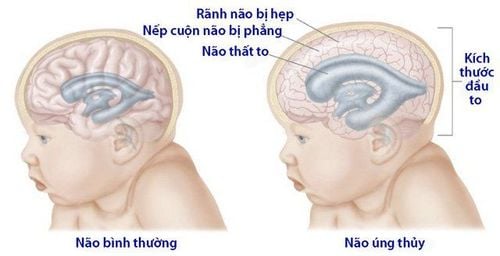This is an automatically translated article.
The article is professionally consulted by Master, Doctor Bui Ngoc Phuong Hoa - Department of Medical Examination & Internal Medicine - Vinmec Danang International General Hospital.
Hydrocephalus is a common disease in the central nervous system. Surgical treatment of hydrocephalus can restore and maintain normal cerebrospinal fluid levels in the brain. Various treatments are also used to control symptoms or functional impairment caused by hydrocephalus.
1. What is hydrocephalus?
Hydrocephalus (English name is Hydrocephalus) is the result of an interruption or imbalance between the formation, circulation, flow or absorption of cerebrospinal fluid. In other words, it is the accumulation of too much cerebrospinal fluid in the ventricles due to disturbances in the processes of production, circulation and absorption.Hydrocephalus can be an acute or chronic condition that persists for months or years. The different forms of the disease include the obstructive, the communicating, and the normal pressure hydrocephalus.
2. Symptoms of hydrocephalus 2.1. Children aged 0-1 In young children, because the skull joints are not closed, the most obvious symptom is an abnormally rapid increase in the size of the head, and the scalp is thin and shiny. In addition, the anterior fontanelle is also dilated and stretched, the skull joint line is dilated, the anterior fontanel can be palpated adjacent to the posterior fontanel, the blood vessels under the scalp are also dilated than usual. Loss of pulse, the child's forehead is very wide. The eyes are usually in a downward facing position, creating the "sunset" sign.
2.2. In older children In older children, the skull joints are partially closed, so the sign of big head will be difficult to recognize. However, children who come to the clinic late often bring a strangely large head. Symptoms of hydrocephalus are usually:
Head circumference increased by more than 2 standard deviations, signs of broken shell can be seen; Irritability, irritability, fatigue, loss of appetite, vomiting a lot in the morning; Signs of headache are prominent signs, children often have a lot of headaches in the morning with vomiting; Blurred vision with parinaud syndrome, papilledema with papilledema, diplopia due to sixth nerve palsy (due to severe raised intracranial pressure); Altered gait, coordination disorder; mental retardation - motor;

Headache; lethargy; Loss of coordination or balance; Loss of control of urination; Visual impairment; Impaired memory, concentration and other thinking skills affect work performance. 2.4. Elderly Among adults 60 years of age and older, common signs and symptoms of hydrocephalus include:
Loss of control over urination; Lost memory; Gradual loss of thinking or other thinking skills; Difficulty walking; Poor limb coordination or loss of balance.
3. How to treat hydrocephalus?
One of two surgical treatments that may be used to treat hydrocephalus include:3.1. Surgical shunt implantation This is a common treatment for hydrocephalus in infants. The doctor inserts a long tube, made of silicon, into the ventricles where cerebrospinal fluid accumulates. This catheter drains the cerebrospinal fluid from the brain. At the same time, the doctor will also attach a valve at a point near the ventricles. This valve will control the flow, under increased pressure, the cerebrospinal fluid will escape from the ventricles, and at the same time prevent the backflow of cerebrospinal fluid into the ventricles when the patient changes position. The tube is then placed under the skin to another part of the body where excess cerebrospinal fluid can be absorbed more easily - such as the abdomen or a chamber in the heart. People with hydrocephalus typically maintain a shunt system for life and require frequent monitoring.
3.2. Endoscopic 3rd ventricle floor demolition With this method, the doctor will make an incision in the ventricle and insert a detector to enter the ventricular system and at the same time create a new pathway for cerebral fluid flow. marrow. This method is less painful for the patient but not very effective for the newborn.

3.3. Other treatments Some people with hydrocephalus, especially children, may need additional treatment, depending on the severity of their long-term complications.
The comprehensive pediatric hydrocephalus care team includes:
The pediatrician or physician, who oversees the medical care and treatment plan; Pediatric neurologist, who specializes in the diagnosis and treatment of neurological disorders in children; Career counselors who specialize in the development of skills for children; A developmental therapist, who specializes in therapy to help children develop age-appropriate behaviors, social skills, and communication skills; A mental health professional, such as a psychologist or psychiatrist; Social workers who assist families in accessing services and planning transitions in care; Special education teacher who addresses learning disabilities, identifies educational needs, and identifies appropriate educational materials; Adults with more severe complications can also access services for occupational therapy, social workers, dementia care, or other medical problems.
In summary, hydrocephalus in each type of patient has different manifestations and different treatment methods, one treatment method may be effective for one subject but not for another. Therefore, in order to be consulted and choose the most appropriate treatment, patients should choose medical examination and treatment at a large, reputable hospital.
Master. Doctor Bui Ngoc Phuong Hoa has more than 24 years of experience in the field of neuropsychology. Doctor Hoa was formerly Deputy Head of the Department of Neurology - Quang Ngai Provincial General Hospital and participated in many continuous training courses on Epilepsy, Cerebrovascular Accident, Alzheimer's, Movement Disorders, Geriatrics. Endocrine Pathology.
Please dial HOTLINE for more information or register for an appointment HERE. Download MyVinmec app to make appointments faster and to manage your bookings easily.
Reference source: mayoclinic.org




